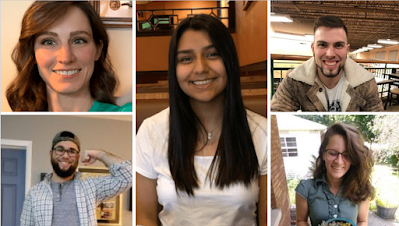Even though the COVID-19 shutdown pushed the whole campus online,
summer research in the Rizk lab did not stop. Instead, the students worked with
Dr. Rizk to adjust their research to a virtual experience. Together, the
students worked on computational modeling of protein assemblies, learned how to
read and present articles, and met regularly through weekly zoom lab
meetings.
Senior Biochemistry majors Brody Deming (top right), Michael Dean-Laffin (bottom left), and Jordan
Harriman (bottom right) received SMART grants for their
summer research. Brody used the software Chimera to model the interactions of
sugar binding proteins that form nanostructures. Michael used a number of
modeling tools as well as 3D-printing to construct models of self-assembling
nanostructures based on bacteriophages, viruses which infect bacteria. Jordan
used modeling to redesign a bacterial protein for the detection and monitoring
of environmental pollutants.
Sophomore biology major Rose Inchauregui (middle) and junior Biochemistry major Catherine Duselis (top left) collaborated on constructing conformation-specific reagents for developing glucose biosensors. Rose received funding from the LSAMP program supporting underrepresented minorities in STEM and Catherine received work-study support through the Cottrell Scholar's Award grant.
